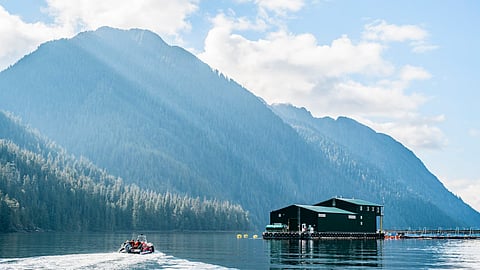

The industry claims such wealth can be achieved by providing sustainable local protein while protecting wild salmon through innovative technologies and practices.
Photo: Cermaq Canada.
Following British Columbia Premier David Eby's speech at the BC Natural Resources Forum, in which he pledged to strengthen the Canadian province's economy through responsible resource development, BC's business and resource sector leaders released a joint statement urging the government to move quickly from words to action. Among them was the Executive Director of the British Columbia Salmon Farmers Association (BCSFA), who claimed that BC salmon farmers could generate CAD 4.2 billion (EUR 2.8 billion / USD 2.9 billion) in output by 2040.
In his speech, Premier Eby underscored the vital role that resources play in the province's prosperity, from their contributions to family-sustaining jobs to the revenue they generate for public services such as health care, or their support for First Nations reconciliation.
Eby argued that, in the face of government budget deficits, weak private sector job growth, and global uncertainty - including the possibility of U.S. tariffs with Trump coming to power-, British Columbia must take bold steps to strengthen its economic resilience, and so growing the province's economy by supporting the development of its resources makes sense.
As a way to foster this growth, BC's Premier outlined a vision to reduce bureaucracy, speed up decision-making, and ensure that the government no longer works in opposition to industry.
Gathered by Resource Works - a non-profit public interest advocacy and communications organization based in Vancouver, BC, whose mission is "to reignite the promise of Canada's economic future by leading a respectful, inclusive and fact-based dialogue on natural resource development" - leaders from all resource sectors in the area, including agriculture, aquaculture, forestry, mining, and natural gas, showed their support for Eby's vision of increasing the province's prosperity through resource development.
"We support the vision and urge the government to move swiftly from words to action. This includes regularly engaging with industry, working towards efficient regulatory processes, and encouraging investment across all resource sectors," reads the statement signed by the leaders of the Business Council of British Columbia (BCBC), Association for Mineral Exploration (AME), BC Salmon Farmers Association, BC Agriculture Council, BC Council of Forest Industries, Canadian Association of Petroleum Producers, Mining Association of BC, First Nations LNG Alliance, Canadian Propane Association, and Resource Works itself.
"The government has an opportunity to build confidence among investors, strengthen the province's economy, and secure a prosperous future for generations to come. We stand ready to collaborate with the government to achieve these goals and build an economy that works for everyone," the statement concludes.
As noted, behind this joint statement released by Resource Works were the leaders of each of British Columbia's natural resources. Representatives from forestry, agriculture, mining, natural gas, and, of course, aquaculture highlighted what their respective natural resources can contribute.
In this context, BCSFA Executive Director Brian Kingzett recalled that British Columbia salmon farmers contribute more than CAD 1 billion (EUR 670.7 million / USD 698.8 million) to the BC economy and are vital in small remote coastal communities with positive impacts that ripple to urban areas in the province.
Kingzett went further and assured that "BC Salmon Farmers could generate CAD 2.5 billion (EUR 1.6 billion / USD 1.7 billion) in output, CAD 930 million (EUR 623.8 million / USD 649.8 million) in GDP and 9000 jobs paying CAD 560 million (EUR 375.7 million / USD 391.3 million) in wages by 2030 and CAD 4.2 billion (EUR 2.8 billion / USD 2.9 billion) in output by 2040, providing sustainable local protein while protecting wild salmon using innovative technologies and practices."
However, before the first of those possibilities highlighted by the Executive Director of the British Columbia Salmon Farmers Association arrives - and unless something changes following the resignation of Prime Minister Trudeau, whose cabinet was the driving force behind the measure - the province's aquaculture sector will have to deal with the Federal Government of Canada's ban on open net-pen salmon aquaculture by 2029.
Moreover, even before that comes, BC salmon farmers will also have to deal with a transition plan that the government itself acknowledges will "disproportionately" affect some of the province's most vulnerable populations. According to the industry and the Coalition of First Nations for Finfish Stewardship (FNFFS), the whole process could cost all Canadians at least CAD 9 billion (EUR 6 billion / USD 6.2 billion).
